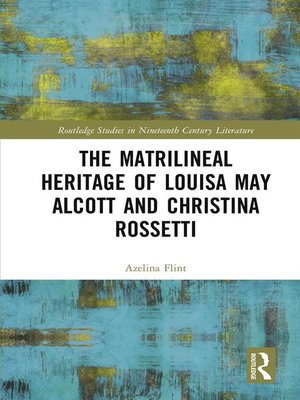The Matrilineal Heritage of Louisa May Alcott and Christina Rossetti
ebook ∣ Routledge Studies in Nineteenth Century Literature
By Azelina Flint

Sign up to save your library
With an OverDrive account, you can save your favorite libraries for at-a-glance information about availability. Find out more about OverDrive accounts.
Find this title in Libby, the library reading app by OverDrive.



Search for a digital library with this title
Title found at these libraries:
| Library Name | Distance |
|---|---|
| Loading... |
In an unprecedented comparison of two of the most important female authors of the nineteenth century, Azelina Flint foregrounds the influence of the religious communities that shaped Louisa May Alcott's and Christina Rossetti's visions of female creativity. In the early stages of the authors' careers, their artistic developments were associated with their patrilineal connections to two artistic movements that shaped the course of American and British history: the Transcendentalists and Pre-Raphaelites. Flint uncovers the authors' rejections of the individualistic outlooks of these movements, demonstrating that Alcott and Rossetti affiliated themselves with their mothers and sisters' religious faith. Applying the methodological framework of women's mysticism, Flint reveals that Alcott's and Rossetti's religious beliefs were shaped by the devotional practices and life-writing texts of their matrilineal communities. Here, the authors' iconic portrayals of female artists are examined in light of the examples of their mothers and sisters for the first time. Flint recovers a number of unpublished life-writings, including commonplace albums and juvenile newspapers, introducing readers to early versions of the authors' iconic works. These recovered texts indicate that Alcott and Rossetti portrayed the female artist as a mouthpiece for a wider community of women committed to social justice and divine communion. By drawing attention to the parallels in the authors' familial affiliations and religious beliefs, Flint recuperates a tradition of nineteenth-century women's mysticism that departs from the individualistic models of male literary traditions to locate female empowerment in gynocentric relationships dedicated to achieving a shared revelation of God.







